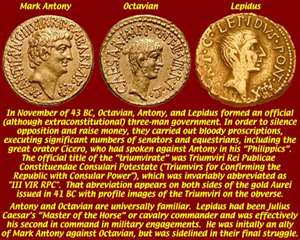The Second Triumvirate
The Second Triumvirate was Ancient Rome's second three-man ruling committee and featured just as much internal squabbling as the First Triumvirate.
The death of Julius Caesar, in 44 B.C., brought on a power vacuum, which was filled by three men: Marc Antony, Caesar's most trusted lieutenant; Octavian, Caesar's nephew; and Marcus Aemilius Lepidus, a powerful patrician who had been Caesar's deputy dictator. Together, they formed the Second Triumvirate in 43. It was an officially sanctioned body, unlike the First Triumvirate, and the triumvirs had ultimate power for a five-year term. (This, many historians say, signlled the end of the Roman Republic.) To cement the alliance, Antony gave his stepdaughter Clodia Pulchra to Octavian in marriage. Lepidus, after helping Octavian defeat the rebellious son of Pompey, tried to grab Octavian's legions for himself and ended up being expelled from the Triumvirate. (His power gone, he lived an uneventful few years in exile and then died in 13 B.C.) Octavian found out about Antony's affair with Egyptian pharaoh Cleopatra and turned it to his advantage, publicizing the relationship and also Antony's will, which decreed that his inheritance would go to Cleopatra's children, not those of Octavia, to whom he was still married. Octavian convinced the Senate to declare war on Cleopatra, not Antony, meaning that it wasn't the kind of civil war that Caesar and Pompey had fought. The fighting began in 32 and ended with Octavian's decisive victory at the Battle of Actium, in 31 B.C. Antony and Cleopatra both took their own lives, leaving Octavian in sole command of Rome. Like his uncle before him, Octavian consolidated his power and took sole control, as Rome's first emperor, with a new name: Augustus. |
|
Social Studies for Kids
copyright 2002–2026
David White



 Antony and Octavian joined together in 42 to hunt down Caesar's two most powerful assassins, Brutus and Cassius. After two battles at Philippi, Antony and Octavian emerged victorious and Brutus and Cassius ended their own lives. Following this, the triumvirs divided the Roman provinces into spheres of influence, with Lepidus taking Spain and Africa, Antony taking the East, and Octavian taking the West. Along about this time, Antony married Octavian's sister, Octavia.
Antony and Octavian joined together in 42 to hunt down Caesar's two most powerful assassins, Brutus and Cassius. After two battles at Philippi, Antony and Octavian emerged victorious and Brutus and Cassius ended their own lives. Following this, the triumvirs divided the Roman provinces into spheres of influence, with Lepidus taking Spain and Africa, Antony taking the East, and Octavian taking the West. Along about this time, Antony married Octavian's sister, Octavia.
